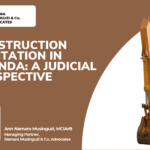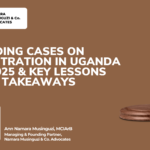ALTERNATIVE DISPUTE RESOLUTION AND THE DIFFERENT FORMS.
Alternative Dispute Resolution(ADR) is a form of Dispute Resolution where parties resolve disputes without recourse to Court. The most common forms of ADR include; negotiation, mediation, adjudication and arbitration.
Negotiation: Amicable resolution of disputes by parties mutually without the intervention of a third party.
Mediation: Resolution of disputes between parties as guided by a neutral third party known as a Mediator. To note that the decision of the Mediator is not binding.
Adjudication; a form of dispute resolution, peculiar to construction contracts, where parties submit their disputes to an individual or a tribunal(DAB/DAAB)which renders a decision within a contractually stipulated time. Adjudication is final and binding in the interim until a party dissatisfied with the decision proceeds to submit the same to Arbitration where it is heard de novo.
According to the 2024 Report published by Kings College London, The level of party compliance with adjudication decisions is high. As per a survey carried out, 52% of questionnaire respondents stated that, in the past year, not a single adjudicated dispute was referred to litigation or arbitration. Adjudicators are appointed either by agreement of the parties or by Adjudicator Nominating Bodies which include FIDIC, CIArb and in Uganda; Construction Law Institute. All Adjudicator Nominating Bodies have rules governing the Adjudication process and parties are free to adopt those rules even in instances where the Adjudicators are appointed in an adhoc manner. The Jury is still out as to whether an Adjudication decision is enforceable seeing that most construction contracts provide for Arbitration if parties are dissatisfied with the decision of the Adjudicator(s).
In the case of Uganda National Roads Authority V TK Engineers Ltd V Bank of Uganda Misc. Application No. 750 of 2019[Arising from EMA 689 of 2019], the Court set aside the garnishee order that had been issued attaching the Applicant’s funds in the 2nd Respondent holding that the garnishee order was illegally issued because arbitration proceedings had commenced.
In contrast however, in the case of Debswana Diamond Company(PTY) Ltd V Liftoff Investments(PTY) Ltd(Court of Appeal Civil Appeal No. CACGG-292-23) the Court of Appeal of Botswana enforced the decision of the DAB. It stated thus: “I conclude therefore that in proper circumstances, DAB Awards may be referred to the High Court for enforcement. To that, I must add the caveat that courts should, as a general rule, be slow to enforce such awards and that judicial interference should be resorted to in exceptional circumstances only, such as where the contractual imperatives relating to resolution of disputes are found wanting.” In this case unlike the UNRA case, nearly one and a half years after the decision of the DAB, no arbitrator had been agreed upon.
ALTERNATIVE DISPUTE RESOLUTION IN CONSTRUCTION CONTRACTS.
Construction contracts commonly contain a hybrid dispute resolution clause that is; providing for more than one form of dispute resolution.
PPDA: Adjudication as second resort when a party is dissatisfied with a decision of the Project Manager. Adjudicator required to give a decision in writing within 28 days after the referral. A dissatisfied party may then elect for Arbitration which is final and binding. If no Arbitral proceedings are commenced within 28 days from the date of rendering of the Adjudication decision, then the decision shall be final and binding(GCC 1.32).
FIDIC suite 1999(GCC 20.4): Adjudication as second resort when a party is dissatisfied with a determination of the Engineer. To note that before making a determination, the Engineer is required to consult with each party in an endeavour to reach an agreement. Adjudication carried out by a DAB which is jointly appointed by the date stated in the contract and in accordance with the procedure laid out in GCC 20.2 & 20.3 respectively. DAB to render a decision within 84 days(Or such other time as it proposes and the same is accepted by the parties). A party dissatisfied with the decision of the DAB is required to issued a Notice of Dissatisfaction(NOD) within 28 days. Where no NOD has been issued, then the decision becomes final and binding. Where a NOD has been issued, the parties are required to amicably settle the dispute within 56 days, failure of which the same shall be referred to arbitration which is final and binding.
FIDIC Suite 2017(GCC 21.1): Introduction of a DAAB is the major difference in respect to dispute resolution. As part of their mandate which is to avoid disputes, the DAAB is required to informally settle disputes which are brought to their attention if they are jointly requested to do so by both parties. To note that these informal proceedings are not binding on the parties. Parties required to refer dispute to DAAB within 42 days from the date of giving or receiving a NOD failure of which the NOD is deemed invalid. DAAB to render its decision within 84 days unless its fees have not been paid in full. A party dissatisfied with the decision of the DAAB is required to issued a Notice of Dissatisfaction(NOD) within 28 days. Where no NOD has been issued, then the decision becomes final and binding. Where a NOD has been issued, the parties are required to amicably settle the dispute within 28 days from issuance of the NOD, failure of which the dispute shall be referred to arbitration which is final and binding.
ARBITRATION
Arbitration is a mode of Alternative Dispute Resolution where two parties agree to submit their dispute to a neutral third party or Tribunal for determination. The decision of the Arbitrator is final, binding and not appealable(Unless parties explicitly agree); with very limited grounds to set it aside.
The notable international arbitration centers include the London Court of International Arbitration (LCIA), the International Centre for Settlement of Investment Disputes (ICSID) under the auspices of the World Bank), the International Chamber of Commerce (ICC), the Singapore International Arbitration Centre (SIAC) and Hong Kong International Arbitration Centre (HKIAC). In Uganda the arbitration centers are Center For Arbitration and Dispute Resolution(CADER) and International Center for Arbitration and Mediation in Kampala(ICAMEK).
In Uganda, the governing law is the Arbitration and Conciliation Act Cap 5 which mirrored the UNCITRAL Model Law on Arbitration.
The Arbitration and Conciliation Act, Cap 5 (Laws of Uganda 2024) domesticated the New York Convention on the Recognition and Enforcement of Foreign Arbitral Awards, 1958 (“New York Convention”). It also domesticated the Convention on the Settlement of Investment Disputes Between States and Nationals of Other States 1966 (“ICSID Convention”). Having ratified and subsequently domesticated both Conventions, Uganda is thus obliged to enforce awards presented to its courts for enforcement by States that have adopted both conventions, in accordance with the relevant terms of the respective conventions.
To note that Arbitration is founded on agreement of the parties and it therefore should be included in the Construction Contract. Even where parties have not included an Arbitration Clause in the contract, they are free to adopt Arbitration and execute an agreement to that effect in the event that a dispute arises. The Arbitration Clause is taken as a stand alone agreement within the contract by virtue of the principle of separability.
KEY FEATURES OF AN ARBITRATION CLAUSE
An Arbitration Clause must have certain key features such that it does not become pathological. These are;
It must be final:
Example of a clause that is not final: “In case any dispute arises, the same shall be submitted to arbitration which shall be carried out by an Arbitrator mutually agreed by the parties. A party aggrieved by the decision of the Arbitrator shall proceed to Litigation before a Court with Competent jurisdiction.”
It must specify the scope of disputes that are arbitrable.
Should specify the Seat i.e. Lex Arbitri:
The seat is not the venue. The venue is the place where the arbitration shall be carried out. The seat is the legal regime governing the Arbitration. It determines enforcement and setting aside applications, interim protective measures and all other interventions of Court. In the event that parties do not specify the seat, they can by mutual agreement agree on the seat.
Should specify the Law governing the Arbitration:
Sulamerica CIA Nacional de Seguros SA and others v Enesa Engenharia SA and others [2012] EWCA civ 638, 16 May 2012: the Court of Appeal in England held that the law of the arbitration agreement may not be the same as that of the contract. In the absence of this, the parties can agree to adopt either the law of the contract or the law of the seat.
Should specify mode of appointing the Arbitrators(s):
In the absence of this or in case the parties fail to agree, the agreement should state the appointing authority which can be an individual or an entity for example; the Chartered Institute of Arbitrators-Uganda, Uganda Society of Architects and any other entity agreed upon by the parties. In the event that the agreement is silent on who the appointing authority is, in Uganda, CADER and ICAMEK are legally recognized as appointing authorities.
Should specify the rules governing the Arbitration.
To note that if it is a FIDIC construction contract, the rules are specified and these are the ICC Rules. For other contracts, the parties are free to agree on the rules. Examples of rules: CADER Rules, ICAMEK Rules, LCIA Rules.
Should specify whether it is adhoc or institutional.
SETTING ASIDE & ENFORCING OF AWARDS.
Internationally, setting aside of an award is limited to grounds contained in Legislation. These include bias, the award being contrary to public policy, the award arising from a dispute that is not arbitrable, the award not being valid under the governing law, among other instances (See Section 35 of the Arbitration & Conciliation Act Cap 5 in instances where parties have chosen Uganda as the seat). In Uganda, An application to set aside the award must be filed 30 days after the award is rendered by the Arbitrator. The 30 days start to run as soon as the Award is delivered by the Arbitrator.
With respect to enforcement; The Arbitration and Conciliation Act, Cap 5 (Laws of Uganda 2024) domesticated the New York Convention and ICSID Convention respectively. Having ratified and subsequently domesticated both Conventions, Uganda is thus obliged to enforce awards presented to its courts for enforcement by States that have adopted both conventions, in accordance with the relevant terms of the respective conventions.
SYNOPSIS OF ARBITRATION PROCESS.
Properly drafted Arbitration Clause.
Commencement of Arbitration by the Aggrieved Party once a dispute arises by communicating to the other party that a dispute has arisen and the same has been referred to arbitration.
Appointment of Arbitrator in accordance with the terms of the contract failure of which the parties refer the appointment to an appointing authority. To note that it is pertinent that an Arbitrator is appointed who has the expertise in Construction Law. It is also important that the Arbitrator has a globally recognized credential to Arbitrate for example; one issued by the Chartered Institute of Arbitrators-CIArb which is the gold standard worldwide.
Acceptance by the Arbitrator of their appointment and calling for the Preliminary Meeting.
Conducting of the Preliminary Meeting wherein parties agree on mode of procedure and filing of all relevant documents within stipulated timelines. At this stage, the parties agree on the Tribunal fees as well.
Conducting the pre-hearing to ascertain that all directives of the tribunal given in the Preliminary Meeting have been complied with. At this stage, parties also agree on whether to proceed by documents only or whether they shall call witnesses, whether they shall call experts.
Hearing of the Arbitration and agreement of filing of submission and rendering of the Award. The Award must be rendered within the time stipulated by the law of the Seat. If the parties have adopted Uganda as the Seat, the Arbitration and Conciliation Act stipulates that the Award must be rendered within 60 days unless the Tribunal informs the parties that time has been extended(S.31).
To note that the Tribunal, upon application by the parties, can correct any clerical or computational error and may also provide interpretation of any part of the Award that is not clear. They may also make an additional Award.
Application for enforcement and recognition of Award in the event that no application has been made to set it aside.
In Uganda, awards are enforced as decrees of Court.

Ann Namara Musinguzi; MCIArb
Managing Partner, Namara Musinguzi & Co. Advocates
info@namaralaw.com
December 13, 2024



